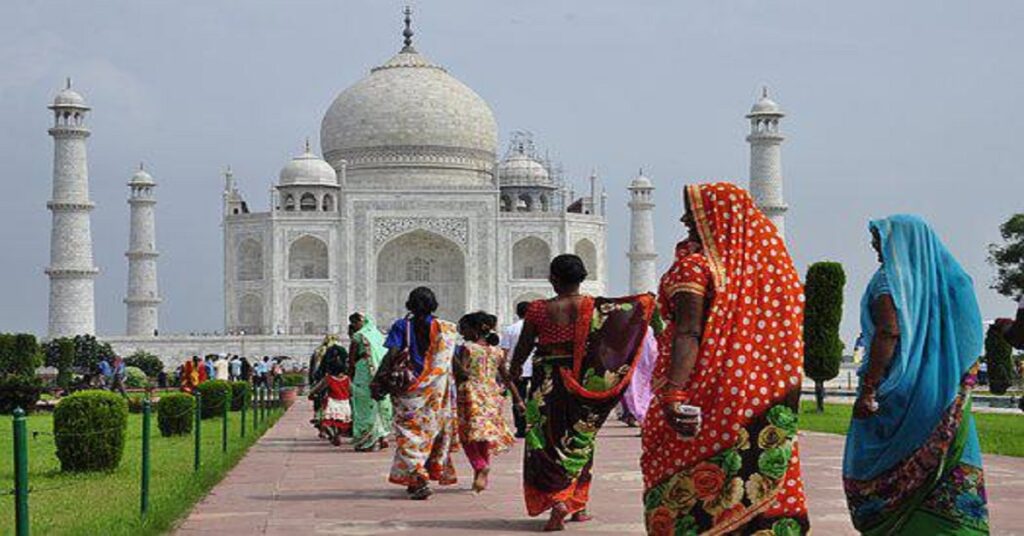In this post, I shall read the summary explanation in Hindi and English of Bihar Board class 12th English chapter ten. India Through a Traveller’s Eye Summary in Hindi & English & Objective Questions.

10. India through a traveller’s eye
‘India through a traveller’s eye’ is a travelogue, written by Pearl S. Written by Buck. She writes her travel details in simple, clear and easy English. He was awarded the Nobel Prize for Literature in 1938. In this quote the author shows her love for the poor people living in Indian villages.
‘एक यात्री के नजर में भारत‘ एक यात्रा वृतांत है, जिसे पर्ल एस. बक के द्वारा लिखा गया है। वह अपनी यात्रा विवरण को सरल, स्पष्ट और आसान अंग्रेजी में लिखती है। उन्हें साहित्य के लिए 1938 में नोबेल पुरस्कार से सम्मानित किया गया। इस उद्धरण में लेखिका भारतीय गाँवों में रहने वाले गरीब लोगों के लिए अपने प्यार को दर्शायी है।
The author had heard about India from the Indian doctor in her family and from his wife. She had read about Buddhism and Jainism. So she comes to visit India. She considers India to be a country of diversity.
लेखिका भारत के बारे में उनके परिवार के भारतीय डॉक्टर और उनकी पत्नी से सुनी थी। वह बौद्ध और जैन धर्म के बारे में पढ़ी थी। इसलिए वह भारत घूमने के लिए आती है। वह भारत को विविधता वाला देश मानती है।
She says that I did not come to India to see the glory of the empire and the big palaces, but I saw two types of groups of people in India. intellectuals living in cities and farmers living in villages. The freedom movement was going on under the leadership of Mahatma Gandhi. The British rulers were preparing for World War II. Indians did not want to help the British.
वह कहती है कि मैं भारत में साम्राज्य की महिमा और बड़े-बड़े महल देखने नहीं आयी, बल्कि मैं भारत में दो तरह के लोगों के समुह को देखा। शहरों में रहने वाले बुद्धिजीवी और गाँवों में रहने वाले किसान। स्वतंत्रता आंदोलन महात्मा गाँधी के नेतृत्व में चल रहा था। ब्रिटीश शासक द्वितीय विश्व युद्ध की तैयारी में लगे थे। भारतीय अंग्रेजों को मदद करना नहीं चाहते थे।
India Through a Traveller’s Eye Summary in Hindi & English
Educated youth in India were unemployed. The people of the village were straight and simple in nature. He was of religious nature. There was honesty in them. He was living his life happily in the houses of Phus. The writer got more respect in the village. The people here are idealists. All the people lived together like brothers.
भारत में पढ़े-लिखे युवा बेरोजगार थे। गाँव के लोग सीधे और सरल स्वभाव के थे। वह धार्मिक प्रवृति के थे। उनलोगों के अंदर इमान्दारी थी। वह फुस के घरों में खुशी पूर्वक अपनी जीवन व्यतित कर रहे थे। लेखिका को गाँव में ज्यादा आदर मिला। यहाँ के लोग आदर्शवादी होते हैं। सभी लोग मिलजुल कर भाई की तरह रहते थे।
The British government was indifferent towards the people. She found that the condition of Indian farmers was worse than that of Chinese farmers.
लोगों के प्रति ब्रिटीश सरकार उदासीन थी। वह पायी कि भारतीय किसानों की हालत चीनी किसानों से दयनीय थी।
India Through a Traveller’s Eye Summary in Hindi & English
In the end, she says that India is the birthplace of many great men. But its condition has become pathetic due to the British rule. She gets mesmerized by the thought of the people here.
अंत में, वह कहती है कि भारत कई महापुरूषों की जन्मदात्री है। लेकिन इसका हाल अंग्रेजी शासन के कारण दयनीय हो गया है। वह यहाँ के लोगों के विचार से मंत्रमुग्ध हो जाती है।
India Through A Travellers Eye
Q 1. India was a part of the background of
(A) the doctor’s life
(B) the wife’s life
(C) the kashmiri man’s life
(D) the Pearl S. Buck’ s life
Ans- (D) the Pearl S. Buck’ s life
Q 2. India Through a Traveller’s Eye is written by ……..
(A) Pearl S Buck
(B) Anton chekhov
(C) H E Bates
(D) Shiga Naoya
Ans- (A) Pearl S Buck
Q 3. Pearl S. Buck is an ……. writer.
(A) British––
(B) American
(C) Indian
(D) European
Ans- (B) American
Q 4. The life span in India was only ……..
(A) 25 yrs.
(B) 27 yrs.
(C) 28 yrs.
(D) 29 yrs.
Ans- (B) 27 yrs.
Q 5. Pearl S. Buck visited India to see the young intellectuals and the …….
(A) leaders
(B) saints
(C) peasants
(D) students
Ans- peasants
Q 6. …… has praised India people and their life.
(A) Shiga Naoya
(B) Pearl S. Buck
(C) Martin Luther king Jr.
(D) Kamala Das
Ans- (B) Pearl S. Buck
Q 7. Pearl S. Buck came to know about India through …….
(A) Buddhism
(B) Hinduism
(C) Islam
(D) Christianty
Ans- (A) Buddhism
Q 8. Who was the real master of the house which Buck visited?
(A) The elder brother
(B) The younger brother
(C) Father
(D) Mother
Ans- (B) The younger brother
Q 9. Who wrote come, My Beloved?
(A) Peal S. Buck
(B) H.E. Bates
(C) Dr. Zakir Hussain
(D) M. Gandhi
Ans- (A) Peal S. Buck
Q 10. India had to teach the west was ………
(A) humanity
(B) cruelty
(C) sickness
(D) None of these
Ans- (A) humanity
Q 11. ‘India Through a Traveller’s Eye’ is ………
(A) a short story
(B) a novel excerpt
(C) a political story
(D) an essay
Ans- (D) an essay
Q 12. Kashmir was invaded by …… barbarian invaders.
(A) white
(B) black
(C) blue
(D) green
Ans- (A) white
Q 13. The president of the General Assembly of UNO is a woman of …….
(A) China
(B) Canada
(C) Germany
(D) India
Ans- (D) India
Q 14. The people of …… must be reckoned as belonging to the Caucasian race.
(A) China
(B) Bhutan
(C) Pakistan
(D) India
Ans- (D) India
Q 15. Who played a vital role in exchange of Korean prisoners?
(A) American General
(B) Indian General
(C) British General
(D) Korean General
Ans- (B) Indian General
Q 16. Who propnesised blood bath in Asia?
(A) Nehru
(B) Winston Churchill
(C) Atlee
(D) None of these
Ans- (B) Winston Churchill
Q 17. Peal S Buck blames the…… for the ills and misfortunes of India.
(A) Zamindars
(B) Industrialists
(C) Britishers
(D) Indians
Ans- (C) Britishers
Q 18. The real ndictment against colonialism was to be found in the …… of India.
(A) cities
(B) towns
(C) districts
(D) villages
Ans- (D) villages
Q 19. According to Pearl S. Buck the main quality of a leader is ……….
(A) selflessness
(B) selfishness
(C) communalism
(D) dishonesty
Ans- (A) selflessness
Q 20. The Indians choe to be on the English side, because inspite of the unjustics. they were choosing between civilization and ………
(A) barbarism
(B) kindness
(C) skepticism
(D) human
Ans- (A) barbarism
BSEB Class 12th English Summary with Objective- Click here
Class 12th Hindi- Click here
Download BSEB Books- Click here
India Through a Traveller’s Eye Summary, India Through a Traveller’s Eye Summary in hindi and english India Through a Traveller’s Eye objective questions, India Through a Traveller’s Eye Summary Class 12th English, Bihar Board Class 12th English India Through a Traveller’s Eye Summary.








